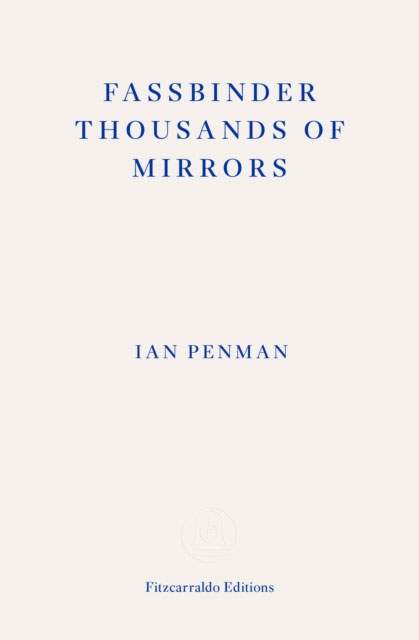
Fassbinder Thousands of Mirrors, Ian Penman (Fitzcarraldo Editions)
This appears to be another case of biography as speculation, inferred rather than researched; but actually it’s really ‘a collage of references’, an elliptical, wandering, pointillist essay, about a filmmaker whose films I have never seen. (I fast-forwarded through one around page 40.) It’s not really about Fassbinder, it’s about Penman and his wide-ranging obsessions.
Penman is very concerned with the artificial versus the authentic as a concept, as well as notions of doppelgangers, twins, reflections and selves (plural). I would suggest that his essay in numbered parts is ‘a private constellation of meaning’, a term he uses to describe Fassbinder’s films. It would have been good perhaps to have had a star chart to aid textual navigation, assist in joining up the dots.
But that would be a different book and getting lost is part of the fun. I teach different forms of essay writing at university, and Penman’s book is the epitome of how essay writing can be part of what gets called creative non-fiction these days. It is a call to arms, notes from a failed revolution, full of reconsideration, regrets, reflection and reassessment; all fuelled by an attachment to Fassbinder.
At times, Penman busily namedrops but then feels guilty about it, beating himself up a few paragraphs later, or perhaps beating his reflection up in the mirror on the page. He seems to have deliberately misunderstood the ‘death of an author’ concept, and insists he is very much alive. This is only to be expected, as the death was to do with the idea that an author somehow controlled what a reader read; the book still had or has the writer’s name on.
If I sound like I struggled with this, I didn’t. I loved it, especially when Penman becomes his own critic. In section 247 on page 102 he asks
How do you inscribe a form of self-portrait into your work
without seeming to do so. The long-time dream of
a deeply personal text made up of other people’s words.
Well, these days, there are plenty of this kind of text, and plenty of theorising that all writers have ever done is remix what already exists, selecting and rearranging things. Penman’s 450 sections add up to what may be a book of film criticism, a book about Fassbinder, a selective autobiography of Penman, a discussion of post-war Germany, of terrorism, drugs, queer sexuality, rock and roll, apocalypse, nostalgia, etc. After all, as Penman notes, we are all ‘afloat in the digital aether, no point in pretending otherwise.’
I suppose I could watch the films but I prefer words.
.
Rupert Loydell

I bought this book on publication. I found it an insightful summary of and introduction to Rainer Werner Fassbinder’s films (I’ve seen most of the films discussed). Penman also deftly discusses the influence of German politics on Fassbinder’s movies and the cinema of the time more widely, and Rainer’s unrelenting devotion to film as an art form. (For me, however, Helma Sanders-Brahms’s No Mercy, No Future best epitomises this period in German film – trigger warning: it’s a very disturbing, albeit unforgettable, watch.) Penman inspired me to read Alfred Döblin’s Berlin Alexanderplatz, which, inexplicitly, had fallen under my radar. Masterpiece is an overused word, but the novel Berlin Alexanderplatz is unquestionably a masterpiece. (I read Michael Hofmann’s eloquent translation.) I now have Fassbinder’s 14-episode adaptation in my DVD viewing pile.
Comment by Mark G on 4 September, 2023 at 8:40 am